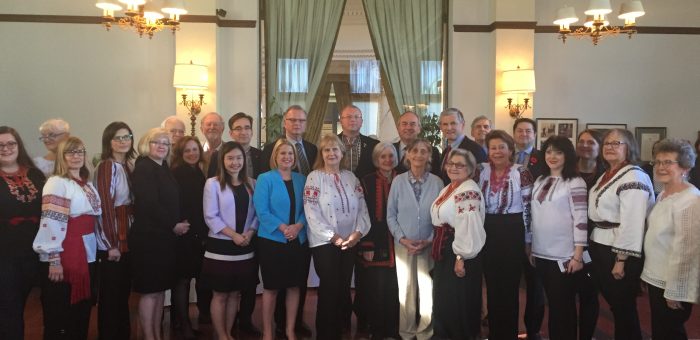Issues & Community Blog - Andrew Weaver: A Climate for Hope - Page 14
Daylight savings or standard time? That is the question
Yesterday evening in the BC Legislature Bill 40: Interpretation Amendment Act, 2019 was debated during committee stage. As readers will know, the BC Green caucus voted against this bill at second reading for reasons that I discussed earlier.
During committee stage I asked the Attorney General a few questions to clarify his rationale for proposing a permanent switch to Pacific Daylight Time instead of Pacific Standard Time.
Below I reproduce the video and text of our exchange.
Video of Exchange
Text of Exchange
A. Weaver: My question with respect to this section is…. I understand the bill was proposed after a very extensive consultation process in the midst of the summer, when everyone’s sitting on their patios enjoying the long summer nights. My question to the minister is: why was the option for remaining on standard time not put to the people as well?
I’ve received quite a bit of feedback from my constituents, invariably opposed to going on daylight time but, rather, staying on standard time. I’m wondering why that option was not put forward.
Many people who’ve expressed their concerns to me have done so saying that they don’t like the change. They understand the research in terms of both the health and safety impacts with springing forward and falling back every year. They understand that. They understand the move and desire to keep on the same time zone.
The arguments were not particularly compelling, as my friend from Kootenay East here pointed out, with respect to interjurisdictional matching, in light of the fact that we have three time zones already in our province and in light of the fact Saskatchewan remains on standard time year round. So does the Fort St. John region. Alberta is going through this process that could end up being on standard time or daylight time or Pacific Time. So why was this not put as one of the potential options?
Hon. D. Eby: Remarkably, 223,000 British Columbians in the summer participated in this engagement, a very significant level of participation. There was an open-ended section in the survey where people could provide their feedback to us. Staff advise that 3 percent of those open-ended answers referred to preferring to be on standard time versus the option that was put forward in the survey.
The key motivator around the options that were presented in the survey was, I think, borne out in the consultation: the idea that we would be well placed to be consistent up and down the coast, from the Yukon all the way down to California, if we could.
I accept the member’s contention that it wasn’t put forward in the survey. But even where people did have an opportunity to raise the issue, we did not see a significant number of folks raising concern about this. It was on the order of about 3 percent.
A. Weaver: Well, I don’t feel that that’s a very satisfactory answer. The question was why it was not put on as opposed to in the open space, where people often…. They like to click boxes in these surveys. There was no option presented.
In the second reading speech, I gave a long discussion about some of the issues that will arise. I would suggest to the Attorney General that the information — does he not feel this is true? — provided to people was incomplete.
The information provided to citizens voting or selecting choices, limited choices, did not really talk about some of the failed models — when we went to daylight savings time in the U.K. in 1968. It did not talk about the safety issues that arose as a direct consequence of that, which is why, in 1971, after people complaining, they switched back to standard time. I remind the Attorney General that our latitudes are actually, in many cases, south of what in Victoria…. And we have other latitudes more north than places in Britain, where this was occurring.
In addition, we know the experiment in the U.S. not once but twice was reversed. Again, once, it was put in and reversed after a short period of time during the OPEC crisis as a direct consequence of people once more complaining. It’s going to matter when people in Prince Rupert and children going to school in Prince Rupert realize that they’re waking up with sunrise at 10:30 in the morning or whatever it might be.
It’s quite different, given that the whole reason that standard time was put in, in the first place was a standard time — recognizing that the solar noon, the temporal noon and our body clock should be as closely matched as possible. This kind of idea here seems to be half-baked.
It’s based on California, Washington and Oregon musing about it. California has since mused about going on standard time instead of daylight time. Frankly, Alaska, in the same corridor, is on a different time zone.
So I come back to the point. Does the minister feel he has the information, in light of the fact that incomplete information was provided to the electorate on which to base a decision? Does he think that, in fact, two years from now, we’re going to be reverting back to standard time like every other jurisdiction that’s done this has done so, because people will be complaining the first time a child gets hit by a car on their way to school in the dark?
Hon. D. Eby: I think it’s important to note for the member that in terms of aligning clocks to when we’re awake, the current method of changing time does the best job of that. If you’re choosing a different time zone, there are pluses and minuses. The member mentions dark mornings as a point of concern. Similarly, on the time zone the member is advocating for, there are very early morning sunrises — 3:30, four o’clock in the morning — during the summer, which has its own consequences.
So the important thing to note is that there are choices to make here. I understand that British Columbians, after they experience not doing a changing of the clock for the first time in generations, may not like it, and they may want to do something else. That is certainly a possibility. It’s not out of the question. I’m sure that the government would listen carefully to concerns like that.
But I can tell the member that we had…. Ninety-four percent of participants in the survey supported the direction of the bill.
A. Weaver: Just one final comment to confirm that it is true that sunrise in daylight savings time does occur at 3:39 in the morning in Prince George on the longest day of the year. But issue with the safety issue is the fact that down in these latitudes, we’re going to have people rising in darkness. They’ll be coming home in lightness. They’re going to be going to school in darkness, and therein lies the essence of the concerns, which I don’t think was brought to the public. With that, I’ll reserve any further questions.
When will government introduce species at risk legislation?
Today in the legislature I rose during Question Period to ask the Minister of Environment and Climate Change Strategy when he would be introducing Species at Risk legislation. As I note in my question (reproduced in video and text below), the introduction of such legislation is part of the minister’s mandate letter.
I also commented that when the Minister was in opposition he introduced his own Species at Risk legislation as a private member’s bill a day after I introduced my private member’s Species at Risk bill on February 27, 2017. I reintroduced my bill in the fall of 2017, once the BC Liberal government had been replaced by the BC NDP government. In all cases, the bills died on the order papers without being debated.
Video of Exchange
Question
A. Weaver: Earlier this year the Intergovernmental Science-Policy Platform on Biodiversity in the Ecosystem Services released the most comprehensive assessment to date on the state of biodiversity and ecosystems worldwide. It warned of unprecedented and accelerating extinction rates with millions of species at risk of disappearing forever, many within decades — more than ever before in human history.
The chair of the report said this: “The health of ecosystems on which we and all other species depend is deteriorating more rapidly than ever. We are eroding the very foundations of our economies, livelihoods, food security, health and quality of life worldwide.” British Columbia has more species at risk than any other province or territory in Canada. Despite this fact, and despite the warnings of the Intergovernmental Panel, we still have no dedicated law to protect endangered species.
My question is to the Minister of Environment and Climate Change Strategy. Why is B.C. still one of the last jurisdictions in Canada without a law to protect endangered species?
Answer
Hon. G. Heyman: Thank you to the Leader of the Third Party for the question. He is absolutely correct that B.C. is Canada’s most ecologically diverse province, and we also have by far the greatest number of species at risk of any province in Canada.
We know that we have a responsibility to take action to protect B.C.’s environment, to protect ecological diversity, to protect species at risk. We know that we need to do it in a way that’s designed in British Columbia. There is a law in Canada, and it is, in fact, a unidimensional law that doesn’t address all of the potential factors that can contribute to healthy ecosystems.
We have spent 2018 and 2019 consulting extensively. Among the examples of stakeholders with whom we’ve spoken are the Nature Conservancy of Canada, the B.C. Wildlife Federation, the Association for Mineral Exploration, the Council of Forest Industries, the SFU faculty of science and the Union of B.C. Municipalities.
It is in my mandate and has been since day one to develop B.C.’s species-at-risk legislation. We are working on that. While we’ve been working on it, we’ve also been addressing a number of areas in British Columbia where species need to be protected in the interim. But we are taking the time to consult, we’re taking the time to listen to Indigenous people, we’re taking the time to listen to communities, and we’re taking the time to get it right.
Supplementary Question
A. Weaver: Thank you to the minister for that answer.
On February 27, 2017, I introduced a private member’s bill to enact endangered species legislation. The following day, and while in opposition, the now Minister of Environment also tabled legislation to protect endangered species in our province. Yet now in government, we have seen no action.
As the minister noted in his mandate letter from the Premier, it states that the minister will: “Enact an endangered species law and harmonize other laws to ensure they are all working towards the goal of protecting our beautiful province.”
I reiterate. We’re two years into this government, and yet B.C. remains one of the only provinces without legislation dedicated to protecting and recovering species at risk.
My question once again to the Minister of the Environment is this. When will we see this government enact a species-at-risk legislation to finally give these threatened ecosystems and species the protection that they need and that British Columbians want them to have?
Answer
Hon. G. Heyman: As I’ve outlined, we are consulting. We are working on it. We have talked to Indigenous people. We have taken action in a number of areas, as I’ve outlined yesterday — and, in fact, in other areas — to protect the species at risk and to deal with endangered ecosystems.
In the time since we’ve taken office, we’ve introduced the Professional Governance Act, a revamped Environmental Assessment Act, a climate plan, a Climate Change Accountability Act. We’re working on a climate adaptation strategy that will be critical to protecting species at risk.
We are doing far from nothing. But we want to make sure that we get it right. We want to learn from the actions that we’ve taken to protect caribou. We need to work with Indigenous people, with local communities, with stakeholders and with environmental scientists to ensure that we have an act in B.C. that protects species at risk, that protects biological diversity and that protects the economic well-being of communities as well as community cultural and social values. We will bring in the act that we’re working on in this mandate.
A statement in advance of Holodomor Memorial Day this Saturday
In the legislature today I rose to deliver a statement in advance of Ukrainian Famine and Genocide (Holodomor) Memorial Day this Saturday. This will be the first time following the passage of my private members’ bill, that this day will be officially recognized in British Columbia.
Below I reproduce the video and text of my statement
Video of Statement
Text of Statement
A. Weaver: This coming Saturday is Ukrainian Famine and Genocide (“Holodomor”) Memorial Day. It’s been a pleasure working with members on both sides of the aisle over the last month to formally recognize this important day in British Columbia.
As members know, Ukrainian Famine and Genocide (“Holodomor”) Memorial Day is particularly important and relevant to my family. My grandfather and his family were survivors of the Holodomor. He and his wife, together with my mother and her siblings, made their way to Canada after the Second World War. Their stories have stayed with me.
During the Holodomor in 1932 to ’33, between three and four million people starved to death due to Stalin’s forced collectivization. Indeed, what unfolded there was horrific. Peasants were forbidden to leave collective farms, and the Ukrainian borders were closed, closely patrolled, to prevent the starving from reaching for bread and searching there in neighbouring Russia.
The Holodomor was a political policy that destroyed the peasants of Ukraine as a social strata and crushed their opposition to the Soviet regime. It’s been recognized by the Ukraine and 15 other countries as a genocide of the Ukrainian people carried out by the Soviet government.
Canada is home to the world’s third-largest Ukrainian population, with an estimated 1.36 million Ukrainian Canadians living across this country, many which have made this province their own home and have contributed to it in all their walks of life. This Saturday, we honour the survivors of Holodomor and their descendants. We reflect upon this horrific atrocity. Holodomor let us also remember that we have a collective responsibility to challenge hatred and intolerance and to protect the vulnerable wherever they are in our society.
24 hours of climate reality: A presentation at Oak Bay High
Today marks the beginning of the 24 Hours of Reality: Truth in Action initiative led by Al Gore’s Climate Reality Project.  Around the world, more than 1700 lectures, with follow-up discussions, are being given to hundreds of thousands of people. I had the pleasure of attending a presentation by Climate Reality Lead Mentor for BC Judy Fainstein (trained by Al Gore in 2008) and Stefan Jonsson, Climate Reality leader (trained by Al Gore in 2019) at Oak Bay High’s Dave Dunnet Community Theatre this morning.
Around the world, more than 1700 lectures, with follow-up discussions, are being given to hundreds of thousands of people. I had the pleasure of attending a presentation by Climate Reality Lead Mentor for BC Judy Fainstein (trained by Al Gore in 2008) and Stefan Jonsson, Climate Reality leader (trained by Al Gore in 2019) at Oak Bay High’s Dave Dunnet Community Theatre this morning.
Following the presentation, I served on a panel with grade 12 student Emma-Jane Burian and grade 9 student Grace Sinats. Readers will know that these two remarkable youth are leaders in the Victoria Chapter of Climate Strike Canada.
What impressed me most about this event was the incredibly thoughtful, insightful and substantive questions posed to the panel by the several hundred youth in the crowd. And listening to answers provided by Grace and Emma-Jane left me with a feeling that as a society, we will be in good hands as these remarkable youth emerge as the decision-makers of tomorrow.
After the event I was presented with a newly designed (by Richard Hunt) Oak Bay Barbarians rugby jersey. I am proudly fashioning the jersey to the right and in the video below, after I introduce a delegation of visitors from the local Taiwanese community, I poke fun at the Premier (who went to Reynolds High School) during the Member Introductions portion of today’s legislative sitting.
Video of Introductions
Bill 40: Interpretation Amendment Act, 2019
Today in the legislature we debated Bill 40: Interpretation Amendment Act, 2019 at second reading. This act, if passed, would allow the government to switch to permanent daylight savings time. As evident in my second reading speech (reproduced in Video and Text below) I spoke (and voted) against this bill.
The reasons why I voted against this bill are fourfold.
First, the survey given to the public last summer followed a flawed process in my view. Only two options were presented and considered:
1. B.C. continues the practice of changing our clocks bi-annually;
2. B.C. adopts year-round observance of Daylight Saving Time.
The option
3. B.C. adopts year-round observance of Standard Time.
was not on the table. This is particularly unfortunate as the survey was also conducted during the summer months while British Columbians were enjoying long sunny evenings without having to worry about concomitant dark mornings. Inadvertently, I would argue, the survey had a built in bias to produce the answer that it did: overwhelming support for moving to year-round observance of Daylight Savings Time.
Second, the move to permanent daylight savings has already been tried, rejected and reversed after complaints in both the United Kingdom and the United States.
Third, switching to permanent daylight savings would mean that children would be heading off to school in the dark. This would lead to safety issues, particularly as you go further north in British Columbia. For example, on December 21, 2019 sunrise would be at 9:02 AM (instead of 8:02AM) in Victoria and 9:27 AM (instead of 8:27) in Prince George.
Fourth, remaining on Standard Time is important in that it ensures that solar noon, 12:00 noon, and hence our internal body clocks are matched as closely as possible. For example, on December 21 of this year, solar noon (maximum solar altitude) in Victoria will occur at 12:12. If we stayed on Daylight Savings time, solar noon would be at 13:12, an hour later.
Had this legislation proposed keeping us on Standard Time year around, I would have supported it as I appreciate the health and safety arguments associated with annually “springing forward” and” falling back”. The reality is, existing legislation already allows the province to move in this direction through an Order-In-Council if the Premier and cabinet deem staying on Standard Time to be in the best interests of all British Columbians.
Video of Speech
Text of Speech
A. Weaver: I rise to take my place in the second reading debate on Bill 40, Interpretation Amendment Act, 2019. This bill proposes to enable government to permanently set the province of British Columbia on daylight saving time, but without prejudicing some of the existing law within local government and acts which enable certain jurisdictions to change between mountain time and standard time.
I’m rising to speak in opposition to this bill for a number of reasons. First and foremost, I would argue that the process which led to the public feedback into this is fundamentally flawed. Two, I don’t think the evidence has actually been explored thoroughly as to why we would shift to daylight, as opposed to standard, time. Let me first say that in politics, it’s often very useful to remember what we’ve done in the past. Too often, societies repeat the same issues that we’ve done time and time again.
We only need go back to the Second World War, when the United States went to daylight time during the extension of the war, to conserve energy, and then went back immediately following the war. We also know that in the U.S. when the OPEC crisis was on, it was decreed that they would stay on daylight saving time during the OPEC crisis. However, 11 months into what was going to be, I believe, a 16-month period, they switched back to standard time, because of the complaints and issues that I’ll raise in a second.
More importantly in 1968, Great Britain went down the path for three full years of actually only having daylight saving time. Then they switched back in 1971 for the reason that I’ll articulate in a few moments — they were seeing, sure, a decrease in the amount of accidents at night but an increase in the amount of accidents in the day — for safety issues, and people complaining about the fact that they no longer were waking up and seeing any sun.
Right now in the province of British Columbia, we actually have three time zones. We have, where we stand here today — we’re standing presently on Pacific Standard Time, which is basically coordinated universal time minus eight hours. That’s on the day we’ll be debating the bill. When the bill was introduced we were on Pacific Daylight Time, which is coordinated universal time minus seven hours.
Fort St. John and the area around there — Dawson Creek, etc. — stay on Mountain Standard Time throughout the year. So there’s always a time difference between Fort St. John and Vancouver in the winter months, but not so much in the summer months, when they are on Mountain Standard Time and we’re on daylight saving time.
To throw a wrench into it, Cranbrook and the areas around there has mountain time, but they still constantly switch between mountain daylight time and mountain standard time. The reason why I raise that is that right off the bat, evidence suggests that any argument that we need to be consistent within neighbouring jurisdictions clearly doesn’t hold up to scrutiny, in that we’re not even consistent in our own jurisdiction.
More importantly, when we look right now, what would happen on December 21 of this year…. Let us suppose we were not…. Well, if we’re on standard time, as we are now, on December 21 — that’s the shortest day of the year — in Victoria, sunrise would be at 8:02 in the morning. If we were on daylight saving time, sunrise would be at 9:02 in the morning. If we’re in Prince George, Pacific Standard Time, sunrise on December 21 of this year would be at 8:27. If we were on Pacific Daylight Time — or Pacific Time, as referred to in this bill — sunrise on December 21 would be at 9:27 in the morning.
Now, this is precisely the reason why these failed experiments, which occurred in the U.K. and in the U.S., to stay on daylight saving time were reversed. People would wake up, particularly in places like Prince George or Victoria. Their kids would go to school. It would be pitch black, not even civil twilight. There would be accidents, and there would be children getting hurt and complaints. One of the reasons why we know that there will be complaints is because the reason why we set standard time is to ensure that the solar clock matches with our internal clock. There’s a reason why we use standard time.
For example, coming back to my illustration on December 21. On December 21 of this year, noon in Victoria will occur at 12:11, coinciding with the maximum solar altitude. There’s a reason for that, because our bodies have adjusted over millennia to understand that in the morning we wake up in the sun, at noon is when the high sun is there and at evening our sleep cycles take us to sleep. If we stayed on daylight time, it would be the high sun at 13:12, an hour later, which is inconsistent with our own internal body clocks.
Deputy Speaker: Thank you. Member, may I pause for a moment?
M. Stilwell: May I seek leave to make an introduction?
Leave granted.
Introductions by Members
M. Stilwell: Joining us in the House today is an award-winning Canadian comedian and performer. He doesn’t have as many awards as I have, so hopefully he can step up his game the next time he comes here to visit. But he is the host of CBC’s The Debaters, which has his participants debating top Canadian topics such as: are forks better than spoons? Or: was Darth Vader a bad father?
I often draw inspiration from Steve’s shows as we debate here in the House, and just as he will be gathering some information here today to formulate some of his future stand-up performances, I believe he actually keeps me around as his friend because our political conversations give him a wealth of material to draw from. So for the record, forks are better than spoons. I think all British Columbians need to know that.
Would the House please make my friend Steve Patterson feel very welcome.
Debate Continued
A. Weaver: Well, I am very pleased to know that we have The Debaters coordinator there. I’m looking so very forward to this upcoming Saturday’s debate, where we actually have: be it resolved that this House approve going to daylight savings time or staying on standard time. I think there could be some very good comedy framed around that, of which I’m sure members in this House would be delighted to participate.
More importantly, the fundamental reason why this process has been flawed is that you don’t ask British Columbians in the height of summer, when they’re sitting on their patios sipping their pina coladas and their margaritas, saying, “Oh, isn’t it glorious to have this evening sunshine” when they’re not actually thinking at the same time, “What about that loss of morning sunshine?” because it’s sunny all the time…. You don’t ask them: “Do you want to stay on daylight savings or not?”
In essence, that was the question. There was no option there for staying on standard time, the option that I suspect we’ll see the European Union go, the option that actually makes sense from our internal clocks and actually the option that makes sense in terms of the solar altitude being overhead at noon in as many jurisdictions as possible.
It is no surprise that government had so many people signing up, because they were given one option in the summer, when they’re enjoying their late evenings. Who wouldn’t want to have lots of late evenings? The information was not provided to the people of British Columbia about many of the negative aspects of doing it — the effects on our internal clocks, the published research on seasonal affective disorder, the fact that we know, historically, there have been safety issues with children going to school, the fact that, historically, this failed experiment has been done in the U.K. for three years and twice in America already. Each time, because of complaints, it’s reverted back to the process.
Now, I’m not arguing that we should continue with the switch from daylight savings to Pacific Standard, because that, too, is an artificial construct. What I’m arguing is that if we’re going to move forward with this…. And we don’t need this legislation to do that because, already, government has the ability through regulation to switch us permanently on standard time if they so wish to do so. This legislation only allows us to potentially give government a decision as to whether they want to move permanently on daylight time.
Given that I would argue, fundamentally, year-round daylight time is simply the wrong approach, and given that the existing legislation already allows government to move through regulation on permanent year-round standard time, which I would have no problem speaking in favour of, and given that it’s clear that people in British Columbia don’t like the switches, it seems to me that this legislation is entirely unnecessary and, if enacted, only gives government options of doing something that we know, historically, we’re just going to turn around….
I look forward to three years from now, if this bill passes and we follow it on this path, to pointing to Hansard and saying: “Look. I told you so.” Everyone is complaining now because Johnny and Jill going to school at eight in the morning are going through in pitch black walking around, and their first accidents are happening. The public outcry is going to be there. We’re going to either revert back to standard time, or we’re going to revert back to a switch.
Standard time would be my preference. I think standard time would be the preference if people were given the information on which to make an informed decision, other than just giving them one option in the midst of summer when we all enjoy our summer evenings.
For that reason, I’ll be voting in opposition to this bill. Thank you for your attention.







